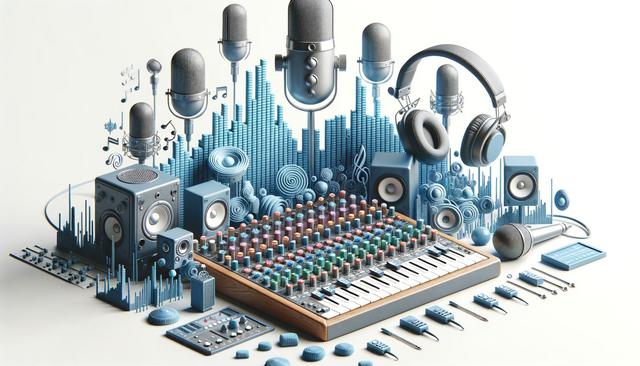Understanding the Role of a Sound Engineer
A sound engineer plays a vital role in capturing, manipulating, and reproducing audio for a variety of applications. Whether it’s live concerts, studio recordings, or broadcasting, the sound engineer ensures that audio is clear, balanced, and impactful. They work behind the scenes using a range of tools and techniques to manage sound quality, often making real-time decisions during live performances. This profession combines a deep understanding of acoustics with hands-on experience in using specialized equipment. Many who are new to the field begin with a basic knowledge of sound recording principles before advancing to complex mixing and mastering techniques.
Key responsibilities of a sound engineer include:
- Setting up and testing microphones and audio interfaces
- Mixing multiple audio sources into a cohesive track
- Managing sound levels during live events
- Editing and enhancing recorded audio using digital software
Learning these fundamentals is essential for anyone interested in entering the industry. As you build your skills, you’ll become more proficient in identifying the best solutions for different audio environments.
Getting Started with Sound Recording
Sound recording is at the heart of audio engineering. It involves capturing audio through microphones and converting it into digital signals for processing and storage. Beginners often start by experimenting with basic recording setups, gradually learning how different microphones, placement techniques, and environments affect the final output. Understanding the technical aspects—such as sample rate, bit depth, and signal-to-noise ratio—can significantly improve the quality of your recordings.
When learning audio engineering basics, consider the different types of recording:
- Studio recording: Controlled environment, ideal for music and voiceovers
- Field recording: Captures environmental or live sound outside the studio
- Multitrack recording: Allows individual editing of each sound source
Each method requires specific equipment and techniques, and gaining hands-on experience is key. Local workshops and online courses are valuable resources, especially when paired with access to gear through options like “Sound Equipment Rental Near Me” services. Renting equipment can be a cost-effective way to explore various tools before investing in your own setup.
Essential Equipment for Audio Engineering
Having access to the right tools is crucial in learning and practicing audio engineering. The typical setup includes microphones, audio interfaces, mixing consoles, monitors, and headphones. Each piece of equipment plays a specific role in the sound recording and mixing process. For beginners, renting gear from a service that offers “Sound Equipment Rental Near Me” can provide a practical and economical way to explore different brands and models without the initial investment.
Essential gear for starting out includes:
- Dynamic and condenser microphones for various recording needs
- Audio interface for converting analog signals to digital
- Digital Audio Workstation (DAW) software for editing and mixing
- Studio monitors and headphones for accurate sound monitoring
Understanding how each component affects sound quality is part of the learning curve. Experimenting with different setups can help you identify the tools that best suit your needs and recording style. This hands-on practice is indispensable when working toward becoming a well-rounded sound engineer.
Improving Skills Through Practice and Projects
Like any technical craft, audio engineering requires consistent practice. Working on small projects such as podcast editing, demo music tracks, or live event setups helps you apply theoretical knowledge in real scenarios. These practical experiences are invaluable and help solidify your understanding of sound dynamics, mixing techniques, and troubleshooting common audio issues.
You can also seek opportunities to collaborate with local musicians, event organizers, or content creators. This real-world application of skills often involves managing a variety of challenges, including acoustics, background noise, and equipment limitations. Utilizing resources like “Sound Equipment Rental Near Me” can give you access to professional-grade tools for these projects without the need for permanent ownership.
As you gain confidence, consider building a portfolio of your work to showcase your abilities. This can include:
- Before-and-after audio samples
- Project descriptions outlining your role in the sound recording process
- Technical details about the equipment and software used
A strong portfolio helps open doors to freelance gigs, internships, and full-time roles in the industry.
Learning Resources and Career Pathways
There are many pathways to learning audio engineering, including formal education, online tutorials, and community workshops. Accredited programs provide structured training and access to professional-grade studios, while self-taught routes offer flexibility and affordability. Regardless of the path, hands-on experience with sound recording and editing is essential for success.
To deepen your knowledge, explore resources such as:
- Online courses and certifications
- Audio engineering books and manuals
- Forums and online communities for troubleshooting and advice
- Internships or assistant positions with experienced sound engineers
As you advance, you may choose to specialize in areas like music production, live sound, broadcast audio, or post-production. Each path offers unique challenges and rewards, and the demand for skilled professionals continues to grow across industries. Renting gear through “Sound Equipment Rental Near Me” remains a practical solution for staying current with evolving technology and adapting to different work environments.
Conclusion: Building a Future in Audio Engineering
Audio engineering is a field that blends technical skill with creative expression. Whether you’re capturing a live performance, editing a podcast, or mixing a studio track, the role of the sound engineer is central to delivering high-quality audio experiences. By learning the basics of sound recording and gradually working with more complex equipment, you can build a strong foundation for a rewarding career.
Leveraging services like “Sound Equipment Rental Near Me” allows aspiring engineers to experiment with professional tools and refine their craft without the upfront costs. With dedication, practice, and access to the right resources, anyone can begin their journey toward becoming a skilled sound engineer. The key is to stay curious, embrace challenges, and continually explore new techniques and technologies.




Leave a Reply